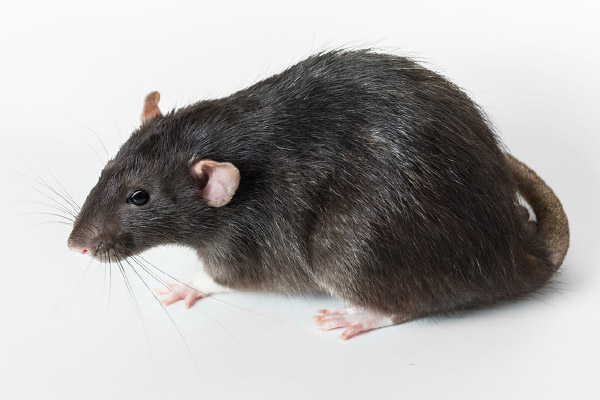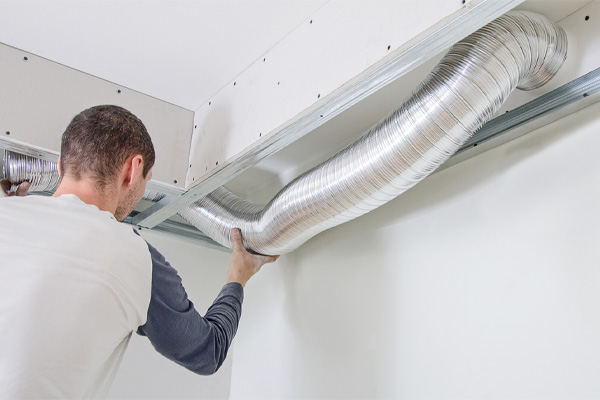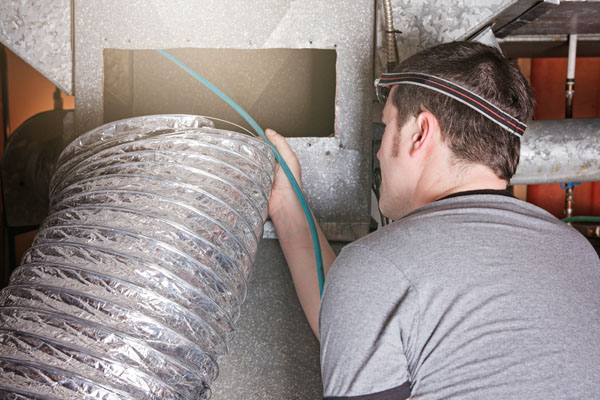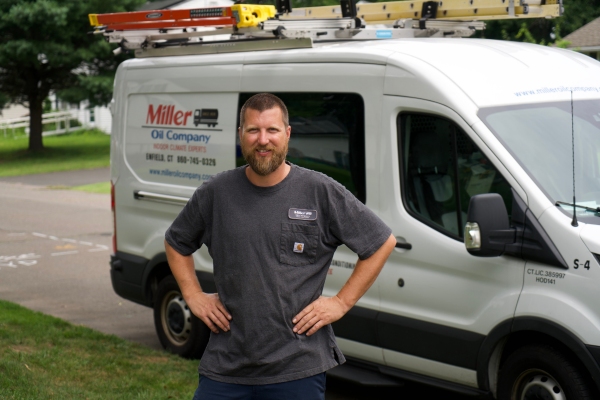Tips On How To Deal With A Dead Animal In Your HVAC Air Ducts

Have you ever entered a room and encountered an unpleasant smell that was difficult to identify? Or maybe you’ve recently started suffering from allergies that seem to have no apparent cause? These issues might indicate the presence of a dead animal in air duct. It’s not uncommon for small creatures, like rodents, to meet their end within a home’s ductwork.
At Miller Oil Company, ensuring your home is a haven of comfort and health is our utmost priority. We provide thorough HVAC solutions designed to address issues like these—efficiently eliminating unwanted odors and contaminants to protect indoor air quality.
In this article, we’ll explain how to identify if a rodent is decaying in your ductwork, provide the essential steps to resolve this distressing issue, and demonstrate how our professional services can help eradicate the problem and refresh the air quality in your home.
Steps to Take When You Discover a Dead Animal in Your Air Ducts
Contents
- 1 Steps to Take When You Discover a Dead Animal in Your Air Ducts
- 2 Detecting a Dead Animal in Your HVAC System
- 3 Immediate Actions for a Dead Animal in Your Air Ducts
- 4 The Importance of Professional HVAC Contractors
- 5 Preventing Rodent Incursions in Your Ductwork
- 6 How Miller Oil Company Can Assist with Dead Rodents in Air Ducts
- 7 Dead Animal in Air Duct: FAQs
- 7.1 How Do I Stop Animals from Getting Into My Air Ducts?
- 7.2 Can a Dead Animal in My Ductwork Harm My Health?
- 7.3 What Steps Should I Take If I Can’t Find the Origin of the Smell?
- 7.4 Can Removing a Dead Animal Damage My HVAC System?
- 7.5 Is It Necessary to Clean My Air Ducts After Removing a Dead Animal?
- 8 Conclusion
- 9 Call Miller Oil Company For All Your HVAC Needs

Discovering a dead animal in your air ducts can be both upsetting and a health hazard. We’ll walk you through the crucial steps to properly remove the carcass and cleanse the area, helping to eliminate odors and prevent health risks. Find out how Miller Oil Company can assist in keeping your ducts clean and safe.
Worried About Your Home’s Air Quality? Enhance your indoor environment with our cutting-edge HVAC solutions, customized to fit your specific requirements. Get in touch with us now!
Detecting a Dead Animal in Your HVAC System

Promptly identifying a dead animal in your HVAC system is crucial to avoid significant damage and health complications. Here are some signs to look out for:
- Persistent Bad Smell: The decay of a rodent produces a potent, foul odor that can permeate your entire house. This distinct stench is often the first sign of a problem in your ductwork.
- Worsening Allergies or Respiratory Conditions: As the animal breaks down, it can emit bacteria and allergens into the air that circulates through your home, potentially worsening allergy symptoms or causing respiratory issues for residents.
- Unexpected Sounds Followed by Odor: If you previously noticed scurrying or scratching noises that abruptly ceased, it could indicate that a rodent became trapped and later died. The sudden stop in these noises, followed by an offensive smell, strongly points to the presence of a dead animal in the ductwork.
- Reduced Air Quality: A deceased rodent can block or diminish airflow and introduce hazardous particles into the air. This situation compromises the comfort and safety of your home, as obstructed or limited airflow can overwork your HVAC system and distribute contaminants throughout your living space.
Enhance Your Family’s Health and Comfort: Rely on Miller Oil Company for professional HVAC maintenance and air quality improvements. Contact us now!
Immediate Actions for a Dead Animal in Your Air Ducts
If you think there’s a dead animal in your air ducts, acting quickly is crucial to limit the effects on your home’s air quality and comfort. Follow these urgent steps:
1. Disable Your HVAC System
Immediately turn off your HVAC system to stop the spread of odors and bacteria. This action prevents the movement of contaminated air throughout your house.
2. Identify the Odor Source

Start by inspecting the vents where the odor is most potent. If possible, examine parts of your ductwork to find signs of the deceased animal. Using your sense of smell is often the fastest way to pinpoint the exact location.
3. Professional Help Recommended for Difficult Removals
Attempting to remove a dead animal from your ductwork can be hazardous if you lack the right equipment or expertise. Dealing with decomposed remains could expose you to health risks, and inadequate cleaning might result in persistent odors or additional problems. In these situations, it’s best to rely on professionals with the necessary tools and knowledge to guarantee complete cleaning and sanitization.
Enhance Your Air Quality and HVAC Efficiency: Allow us to inspect, maintain, and upgrade your HVAC system for better air quality and performance. Get in touch with us now!
The Importance of Professional HVAC Contractors

Dealing with a dead animal in your air ducts is not suitable for a DIY project. Here are the reasons why professional help is essential:
Skilled in Safe Extraction
Professionals are equipped with specialized tools and methods to safely extract the carcass, avoiding damage to your ductwork or HVAC system. Their expertise guarantees thorough removal, minimizing the risks linked with decay and further contamination.
Thorough Cleaning and Sanitization
Once the carcass is removed, it is crucial to thoroughly clean and sanitize the ducts to remove bacteria, parasites, and any residual odors. Professionals utilize industrial-strength disinfectants and specialized equipment to ensure that the air circulating in your home is pure and safe, protecting your family’s health.
Concerned About Airflow Problems?: Let our HVAC specialists diagnose and resolve issues to maximize system efficiency and improve indoor air quality. Contact us today!
Preventing Further Infestations

Professionals don’t just remove the immediate problem; they also inspect your ductwork for potential entry points and provide effective sealing solutions. Additionally, they offer expert advice on measures to deter future rodent invasions, helping maintain a pest-free environment.
Restoring Damaged HVAC Ductwork
Rodents often inflict considerable damage on ductwork, from chewing materials to causing connections to loosen, which can undermine system efficiency and degrade air quality. Professionals are skilled at evaluating the damage’s scope and carrying out essential repairs or replacements. This ensures the HVAC system operates effectively, maintaining optimal airflow and keeping pollutants at bay.
Looking for Ductwork Solutions? Whether it’s repairs or complete replacements, we guarantee leak-free ducts and exceptional air quality. Reach out to us now!
Preventing Rodent Incursions in Your Ductwork
To mitigate the problems that rodents can cause in your HVAC system, here are some proactive steps to consider:
- Seal Off Entry Points: To keep rodents from entering, seal potential access points by closing gaps around vents and ducts with sturdy materials like caulk or metal screens.
- Consistent HVAC Maintenance: Regular check-ups can address minor issues before they become significant, ensuring your system remains efficient and free of rodents.
- Implement Rodent Deterrents: Use safe and effective repellents, such as mesh screens or traps, in areas likely to attract rodents. This helps keep your ductwork clean and secure, safeguarding your HVAC system’s integrity.
How Miller Oil Company Can Assist with Dead Rodents in Air Ducts

Miller Oil Company excels in addressing problems with dead rodents in your HVAC ductwork through expert removal services, ensuring your system continues to operate efficiently and remains in good condition. Our team specializes in thorough cleaning and disinfection, effectively sanitizing your ductwork to remove any residual odors or contaminants.
Additionally, we provide preventative measures such as professional duct sealing and ongoing maintenance services to shield your home from future infestations and ensure the best indoor air quality. Trust Miller Oil Company to maintain your HVAC system in peak condition, preserving your home’s comfort and health.
Safeguard Your Family with Professional HVAC Services: Our maintenance and repair solutions ensure your system operates flawlessly and your air remains pure. Contact us today!
Dead Animal in Air Duct: FAQs

How Do I Stop Animals from Getting Into My Air Ducts?
To prevent animals from infiltrating your ductwork, ensure that all vents, grilles, and external openings are securely covered with robust mesh or vent covers. Regularly examine your home for possible entry points, such as cracks, holes, or gaps in attics, crawl spaces, or walls, and seal them effectively with caulk or steel wool. Professional inspections can also detect concealed vulnerabilities and offer strategies to fortify your HVAC system.
Can a Dead Animal in My Ductwork Harm My Health?
Indeed, a dead animal located in your ductwork can emit dangerous bacteria, parasites, and airborne pollutants into your home’s air, deteriorating indoor air quality. This situation can cause respiratory issues, exacerbate allergies, and produce foul smells. Quick removal and comprehensive sanitization are crucial to reinstating a healthy indoor atmosphere and averting prolonged health dangers.
What Steps Should I Take If I Can’t Find the Origin of the Smell?
If you cannot pinpoint the odor’s source, contacting a professional HVAC technician is advisable. They are equipped with advanced tools like inspection cameras and odor detection equipment, which allow them to identify and locate the dead animal without harming your ductwork. Upon locating the carcass, they will safely remove it, ensuring minimal disruption and maintaining the integrity of your HVAC system.
Enhance Your Air Quality with Your HVAC System: Allow our team to assist with expert inspections, repairs, and system upgrades. Contact us today!
Can Removing a Dead Animal Damage My HVAC System?
Improper removal attempts can cause damage to your HVAC system or ductwork. Professionals use specialized techniques and equipment to carefully extract the animal without harming your system. They also inspect for any damage caused by the animal and make necessary repairs to ensure your system operates efficiently and reliably.
Is It Necessary to Clean My Air Ducts After Removing a Dead Animal?
Absolutely, it is essential to clean your air ducts after removing a dead animal. This step is vital to get rid of any remaining bacteria, parasites, or odors that might persist in your system. Professional duct cleaning services also provide thorough sanitization to guarantee that the air in your home is clean and safe. Furthermore, this procedure helps to prevent future pest issues and maintains your HVAC system’s efficiency.
Conclusion
Identifying indications of a dead animal in your air ducts, such as persistent odors or strange noises, is vital for preserving a healthy living environment. Quick action is essential to minimize the risks associated with prolonged exposure to potential health hazards.
Depending on professionals like Miller Oil Company ensure that the removal is handled safely, the cleaning is thorough, and preventive strategies are effectively implemented. If you suspect any rodent issues in your ductwork, contact Miller Oil Company for extensive services that assure a clean, secure, and odor-free home.
Concerned About Damaged or Leaking Ducts?: Let our skilled team handle ductwork repairs and replacements to enhance your system’s performance and air quality. Contact us today
Call Miller Oil Company For All Your HVAC Needs
Miller Oil Company provides top-notch heating and cooling services throughout the Greater Enfield, Connecticut area. Our team comprises highly skilled, certified technicians adept at delivering excellent HVAC tune-ups, repairs, installations, and replacements. Each technician brings experience and knowledge, ensuring your HVAC system is serviced properly.
We offer the most competitive rates for HVAC services in the region. Our maintenance solutions enhance comfort and increase energy efficiency, lowering heating and cooling expenses. Should you require HVAC repair or a new system, we recommend the most cost-effective solutions tailored to your home and budget.
We stand behind our work with a satisfaction guarantee. Call Miller Oil Company today to arrange a service visit or take advantage of our free in-home consultations. Call now!
To schedule a service appointment, contact Miller Oil Company today. Click the link to view our service area.

Related Articles: